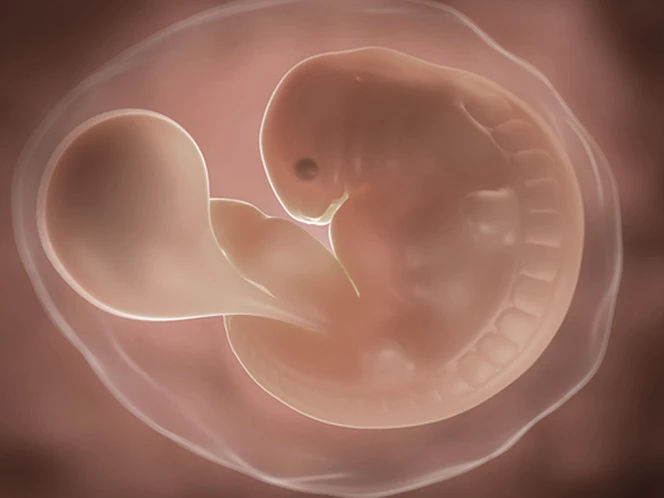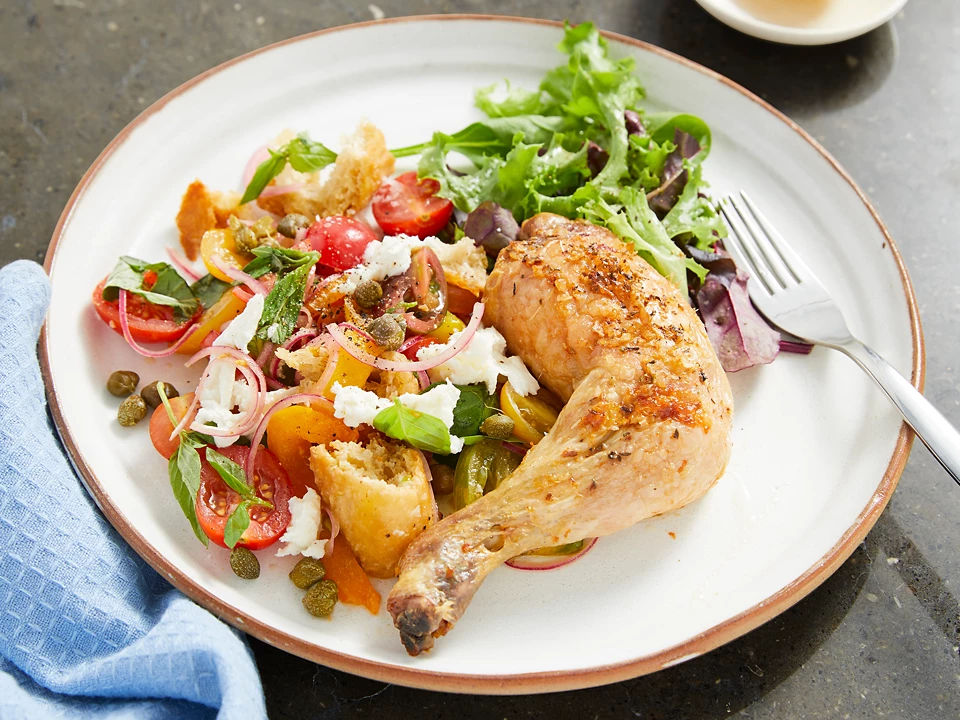Take a look at everything that’s going on for you and your baby at 6 weeks pregnant, from how your body is changing and pregnancy symptoms to the importance of a healthy pregnancy diet.
6 weeks pregnant: pregnancy symptoms & baby development

Explore pregnancy stages week by week
6 weeks pregnant is how many months?
Month 2 (Trimester 1)
At 6 weeks pregnant, you’re now into your second month and first trimester of pregnancy.
Your baby’s development at 6 weeks pregnant
Even as early as 6 weeks pregnant, your baby is busy laying down the essential foundations for their future development.
Right now, your 6-week foetus is forming1:
- ‘Limb buds’ where their arms and legs have started to grow
- Tiny dimples on the side of their head, which will become their ears
- Thickenings on their face, which will become their eyes
- The beginnings of their musculoskeletal system and organs, including their brain and liver.
- The beginnings of their digestive system2
You won’t routinely be offered a scan at this point in your pregnancy. However, you may be offered, or choose to have, a 6-week scan if you’ve experienced problems in a previous pregnancy. This is known as an early pregnancy or reassurance scan and can take place anywhere between 6 and 10 weeks3. If you’re offered a 6-week scan, you might be able to hear your baby’s heart beating at an impressive 110 beats per minute4.

How big is my baby at 6 weeks pregnant, and what do they look like?
Your baby (or 6-week-old foetus) is now around 6mm long (around the size of a pea). They resemble a tiny tadpole due to their curved body and small tail1.
There’s a bulge where their heart is developing, and a bump at the end of their ‘neural tube,’ which will become their head and brain1.
Speaking of your baby’s neural tube, 6 weeks pregnant is a good time to make sure you’re getting all of the nutrients you need for a healthy pregnancy, including folic acid.
Learn more about vitamins and nutrients in pregnancy.
Changes in your body at 6 weeks pregnant
You’re unlikely to have a visible baby bump yet, especially if this is your first pregnancy. However, your body is working very hard to support your baby and provide them with everything they need to grow and develop.
Ensure you have everything you need to support yourself and your growing baby by eating a delicious and healthy pregnancy diet, rich in vitamins and minerals.
Pregnancy symptoms at 6 weeks
Everyone’s experience of pregnancy is different. Some mums-to-be go through their pregnancy with very few symptoms, while others might have a whole range of pregnancy symptoms like morning sickness and bloating - there’s no way to predict what your experience will be.
Let’s take a look at some of the 6 weeks pregnant symptoms you might be experiencing.
Increased blood flow and hormonal changes associated with pregnancy may cause your breasts to become larger and more tender. Your nipples might also stick out more and look darker – this is completely normal (5). Your nipples may also feel sensitive and sore due to the pregnancy hormones in your body.
Feeling tired? You’re not alone. It’s normal to feel more tired than usual or even exhausted during your first trimester (you are growing a whole person after all)5. Take any opportunity to rest when you can, eat a healthy, balanced diet and drink lots of water.
Nausea and vomiting are very common at 6 weeks pregnant, and you may have heard this referred to as morning sickness. Despite the name, morning sickness can happen at any time of the day or night5.
Morning sickness can be unpleasant, but there’s no evidence that it’s harmful for your baby. If you’re struggling to keep any food and water down at all, and the symptoms don’t let up, you could be experiencing a severe type of morning sickness known as hyperemesis gravidarum. Speak to your GP or midwife if you’re struggling6.
Try our top tips for keeping symptoms of morning sickness and nausea at bay6:
- Eat small amounts of plain carbohydrates, such as biscuits, crackers, potatoes, rice, or pasta.
- Try eating dry toast or a dry cracker before you get out of bed to help settle your stomach.
- Note down any tastes or smells that trigger your symptoms and try to avoid them.
- Ginger can help ease nausea, but it might not be a good idea if your morning sickness is severe. Always talk to a doctor for the right treatment and support.
If your symptoms don’t settle or stop you from enjoying your day-to-day, speak to your GP. If you need it, they can prescribe anti-sickness medication that’s safe for you and your baby6.
Feeling bloated or gassy in early pregnancy is usually caused by the hormone progesterone relaxing muscles in your digestive system7. If you’re feeling bloated, try eating smaller meals more often and avoiding eating late at night.
Light cramping and spotting are common in early pregnancy. There might be nothing to worry about, but it's always a good idea to have it checked out by your healthcare provider to be sure8.
Mild cramps could be caused by constipation (a very common pregnancy symptom), trapped wind, or the ligaments around your stomach stretching to support your baby9.
Frequent trips to the loo are one of the most common symptoms at 6 weeks pregnant, as your growing uterus puts pressure on your bladder. This can be a bit of a pain, but keep drinking plenty of water to stay hydrated10.
It’s normal to feel a range of emotions in pregnancy. This can be caused by your hormones as well as the excitement mixed with anxiety of having a baby1. Make sure you lean on the people around you for support and talk to your GP or midwife if you’re feeling low.
Hormones can affect your sense of taste in pregnancy, and you might find yourself craving foods you don’t usually like (or not wanting foods you usually enjoy)11. Not everyone gets cravings, but for some women, they’re a firm feature of their pregnancy.
Focus on: vitamin A from foods in pregnancy
Reviewed by Bahee van de Bor
During pregnancy, you’ll need 700 mcg of vitamin A (L), which you can get from a healthy pregnancy diet.
You won’t need to take a vitamin A supplement, as you’ll get the amount you need from lots of different foods, including12, 13:
- Cheese
- Some milks and yoghurts
- Eggs
- Fortified low-fat spreads
- Green, leafy vegetables, such as kale and spinach
- Cantaloupe melon, mangoes and apricots
- Orange and yellow vegetables, including carrots, peppers, sweet potatoes, butternut squash and pumpkin
Foods rich in vitamin A to avoid during pregnancy
Getting too much vitamin A during pregnancy can actually be harmful to your growing baby’s body and nervous system12.
You should avoid certain foods and supplements that contain high levels of it, such as12:
Liver and liver products like paté
Supplements with high levels of vitamin A, such as fish liver oil (switch to a prenatal multivitamin instead)
The science behind: vitamin A
Vitamin A has two forms:
- Retinol that comes from animal products14
- Beta-carotene, which converts into vitamin A15
It’s an important vitamin during pregnancy, as it supports your baby’s16:
- Visual health
- Immune function
- Growth and development
6 weeks pregnant: next steps
If you haven’t already, now’s the time to book an appointment with your GP to start the antenatal care that will support you throughout your pregnancy.
You might also want to think about:
- Making sure you’re eating a balanced diet and drinking plenty of water
- Exercising safely while you’re pregnant
- Whether you’d like to book any antenatal classes
- If you’re a smoker, talking to your GP or midwife about strategies for quitting
- NHS Best Start in Life. Week 6 [online]. Available at https://www.nhs.uk/start-for-life/pregnancy/week-by-week-guide-to-pregnancy/1st-trimester/week-6/ [Accessed April 2025]
- Indrio F, Neu J, Pettoello-Mantovani M, Marchese F, Martini S, Salatto A, Aceti A. Development of the Gastrointestinal Tract in Newborns as a Challenge for an Appropriate Nutrition: A Narrative Review. Nutrients. 2022 Mar 28;14(7):1405. doi: 10.3390/nu14071405. PMID: 35406018; PMCID: PMC9002905.
- Tommy’s. Early pregnancy scans after a miscarriage [online 2022]. Available at https://www.tommys.org/baby-loss-support/miscarriage-information-and-support/pregnancy-after-miscarriage/early-scans-after-miscarriage [Accessed 2025]
- Valenti O, Di Prima FA, Renda E, Faraci M, Hyseni E, De Domenico R, Monte S, Giorgio E. Fetal cardiac function during the first trimester of pregnancy. J Prenat Med. 2011 Jul;5(3):59-62. PMID: 22439077; PMCID: PMC3279166.
- NHS (2022). Signs and symptoms of pregnancy [online]. Available at https://www.nhs.uk/pregnancy/trying-for-a-baby/signs-and-symptoms-of-pregnancy/ [Accessed April 2025]
- NHS (2024). Vomiting and morning sickness [online]. Available at https://www.nhs.uk/pregnancy/related-conditions/common-symptoms/vomiting-and-morning-sickness/ [Accessed April 2025]
- NHS Best Start in Life. Week 10 [online]. Available at https://www.nhs.uk/start-for-life/pregnancy/week-by-week-guide-to-pregnancy/1st-trimester/week-10/. [Accessed September 2025]
- NHS North Bristol. Bleeding in early pregnancy [online]. Available at https://www.nbt.nhs.uk/our-services/a-z-services/emergency-zone/ed-miu-patient-information/early-pregnancy-bleeding [Accessed April 2025]
- NHS (2024). Stomach pain in pregnancy [online]. Available at https://www.nhs.uk/pregnancy/related-conditions/common-symptoms/stomach-pain/ [Accessed April 2025]
- NHS (2024). Common health problems in pregnancy [online] Available at https://www.nhs.uk/pregnancy/related-conditions/common-symptoms/common-health-problems/ [Accessed April 2025]
- NHS Inform (2025). Eating well in pregnancy [online]. Available at https://www.nhsinform.scot/ready-steady-baby/pregnancy/looking-after-yourself-and-your-baby/eating-well-in-pregnancy/ [Accessed April 2025]
- NHS (2020). Vitamin A [online]. Available at https://www.nhs.uk/conditions/vitamins-and-minerals/vitamin-a/ [Accessed April 2025]
- Royal College of Obstetricians & Gynaecologists. Healthy eating and vitamin supplements in pregnancy [online 2014]. Available at https://www.uhcw.nhs.uk/download/clientfiles/files/pi-healthy-eating-and-vitamin-supplements-in-pregnancy(1).pdf. [Accessed November 2025]
- McEldrew EP, Lopez MJ, Milstein H. Vitamin A. 2023 Jul 10. In: StatPearls [Internet]. Treasure Island (FL): StatPearls Publishing; 2023 Jan–. PMID: 29493984
- Drugs and Lactation Database (LactMed®) [Internet]. Bethesda (MD): National Institute of Child Health and Human Development; 2006–. Beta-Carotene. 2022 Sep 19. PMID: 30000966.
- WHO (2023). Vitamin A supplementation during pregnancy [online]. Available at https://www.who.int/tools/elena/interventions/vitamina-pregnancy [Accessed April 2025]
Last reviewed: November 2025
Reviewed by Nutricia’s Medical and Scientific Affairs Team
related articles
Read More

Need some help?
You can get quick answers to common questions in our FAQs.
Alternatively, if you need help with general pregnancy or baby advice, or maybe on using or ordering our products - our expert team are always on hand to talk about feeding your baby.






